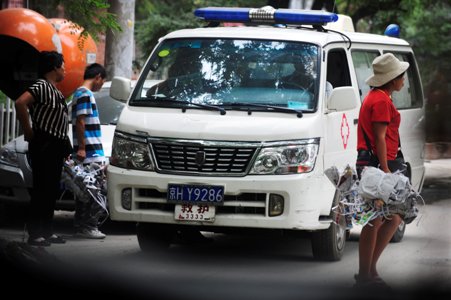Healthy profits for fake ambulances

Beijing is going to crackdown on illegally-operated ambulance services touting for business outside hospitals, health authorities told the Global Times Monday.
Despite these assurances, Ma Yanming, media officer at the Beijing Municipal Health Bureau, said that he does not know any firm details about the proposed legislation, nor when it would come into effect.
But the head of an illegal ambulance operation told the Global Times Monday that business is booming, and claimed he had good connections with staff inside hospitals.
Wang Ming, the manager of Beijing Ambulance Rental Firm, which lists its services online, claimed that doctors and nurses from many Beijing hospitals receive commission from these ambulance companies.
"Hospitals have deals with certain ambulance companies. If one of our ambulances goes to a hospital we don't have a deal with, we can't remove a patient," he claimed.
"Not even a real 120 ambulance can get in," he alleged.
Illegal ambulances are often seen outside Jingtan Hospital, Dongcheng district, the Beijing News reported Monday. They look like legal ones, to confuse people, which can pose risks to patients.
A staff member from Jingtan hospital, who refused to be named, denied Monday that illegal ambulances operate at the hospital, or that there is any collusion between medical staff and the ambulances.
"We're a properly regulated hospital under the city health bureau, and there is no way we could have this sort of ambulance in service," she said.
But Li Jianren, media officer of the 120 Beijing Emergency Medical Center, said Monday illegal ambulances have operated in the capital for years.
"Both 120 and 999 have been struggling to deal with increased demands. Emergency calls are increasing year on year," Li told the Global Times in July.
Together, 120 and the 999 Beijing Red Cross Emergency Rescue Center, received 1,787 calls daily on average last year, but Beijing has only 624 ambulances, making it hard to meet the increasing needs, Li noted.
Despite the flourishing market for illegal ambulances, government departments seem confused as to who is responsible for tackling the issue.
Ma said Monday that it is not the responsibility of the health bureau to regulate ambulances.
"As ambulances are a special vehicle, they need to be approved by the Vehicle Management Office of Beijing Traffic Management Bureau before they are on the road," he said, "they are responsible for the regulation work."
Yet Qi Qi, media officer from the traffic management bureau, said that regulating ambulances is not their duty.
"The municipal health bureau is passing the buck on this matter," he said.
The Global Times found there are many listings for ambulance rentals online, including Wang's company.
Wang said the company has been making more and more money since its establishment in 2002.
"Since the numbers of ambulances in Beijing are inadequate, we can cash in on the huge demand," he said.
He claimed that because his company has connections with doctors and nurses in many Beijing hospitals, patients have nothing to worry about.
Most of the business includes transferring patients between hospitals in Beijing and from Beijing to other cities in China, at an average price of 10 yuan ($1.57) per kilometer.
"The mainstay of the business is long-distance journeys, which is more demanding and profitable," he said.
"We sign a contract with the patients or relatives, which includes the price and destination, but we won't guarantee patients' health condition if something happens on the way," said Wang, adding the ambulance crew is made up of a driver, a nurse and a doctor.
"We [120] have 400 ambulances in our center, five for long-distance transfer services," Li said, although he would not reveal the costs on Monday.
An official ambulance in Beijing costs 10 yuan per kilometer for a long-distance trip, but patients are charged for the empty return trip, according to a previous Global Times report, making illegal ambulances more attractive.
"People only pay one way for my ambulances," said Wang.